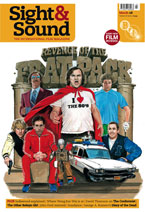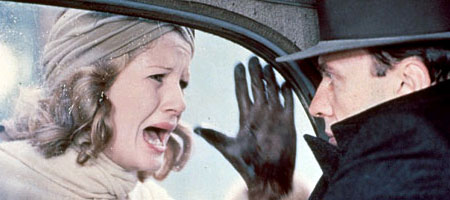
The Killer Inside

Bertolucci's The Conformist prefigured The Godfather in giving us a central character without compassion. It's a cinema that refuses to please, says David Thomson
The international cinema of the late 1960s sang songs of its own rebellion and its escape from the closed conventions of film-making in which the old fascist lies about happy endings and how to get them were promulgated. The most exciting films of the period were explosions and insurrections - Bonnie and Clyde and Easy Rider - or subtler dismantlings of some archaic social or sexual order such as Blow-Up, Belle de Jour, If...., The Long Goodbye and even Celine and Julie Go Boating, in which, if you will, cinema was stormed and its captive characters set free.
So the first thing I would recommend would be to see Bernardo Bertolucci's The Conformist (1970) in that context. It's a film full of degrees of imprisonment (see synopsis, overleaf): the father in a windswept marble arena waiting to have his strait-jacket tied; Clerici's slut wife Giulia (Stefania Sandrelli) helplessly ready to mess around - the one human liberty she still sees as freedom; and Manganiello, chauffeur and assassin, determined to maintain his mission. But of course the surest prisoner of all is Clerici (Jean-Louis Trintignant), our hero, our protagonist, our victim, ourself. From the very start Clerici chooses to mock his own sidling style, the walk of a captive creature - it's his way of being ironic, of pretending he has a greater intellectual liberty. But when most himself, he shrinks, occupying smaller spaces in hunched and tentative postures. He is in the dark or in a recess; he stands where the film lacks light. His pale, boy's face has to be coaxed into those alarming, tender and cruel close-ups. And then we hate what we see.
He would like to be grey, unnoticed, no more than recessively elegant, a stand-in for an actor. But Clerici is practising the anonymity of the Jew who prays not to be identified when the trains are filled. (Losey's Mr Klein is his brother in film.) Clerici wants to be so like others that he goes unremarked. So he marries the Giulia who is "all bedroom and kitchen", hardly realising how far his emotional contempt for her kills himself. And he signs on with the fascists to be a spy, betrayer and killer - or if not quite an executioner then the figure at the end of the front row in the theatre, the one who opts for the oblique view of the show, the connoisseur's angle, in case he's seen there.
The more you watch The Conformist, the more your admiration for Trintignant grows and the more you loathe Clerici. For Clerici is an actor in his own mind. There he is in his honeymoon suite in Paris, sitting in bed waiting for the dawn, as pensive as any film noir hero, not bothering to contemplate the flagrant bottom of his wife beside him - she is his whore already. He thinks he is a secret agent waiting for the phone call that triggers his mission. But he is a fraud, and frozen. He has no murderer's energy. And when he covers his wife's bare bottom before he departs it is not a - gesture of kindness but a crushing tidiness. It's as if when he shot at Lino - the magical chauffeur figure of his childhood - it was not just the - homosexual overture from the grown man that prompted him but the wild spill of Lino's long hair and the simple possession of a gun. Clerici is the kind of man who blames violence on guns left lying around.
And here is the thing that's striking in a film from 1970: Clerici is not brave, reckless, outgoing or charming but is ingrowing, cold, a snob, a coward, a tragic figure who shrugs off his own pain with constant assumptions of superiority. He is a fascist. And I think it's worth noting, if only - historically, that there are ways in which the shock of The Conformist - and no one was really ready for it - enabled the ocean-liner team spirit of a film that came only two years later, and for which Al Pacino might have been advised to study Trintignant (I'm just guessing).
The Godfather (1972) is another story in which the central character faces behaving like the rest of the family, except that some experience of being an outsider makes him extra wise, or pitiless. And as soon as you make the comparison, you see the importance of The Conformist in introducing and making bearable such unlikeable central characters. Once upon a time, we were allowed (or required) to like our movie people. But we have grown up, and The Conformist and The Godfather share a similar process as well as the need to make blackheartedness a fit subject for movies.
So Clerici will preside over the appalling murder of his former professor and of the man's younger wife (Dominique Sanda), a woman Clerici falls in love with on first sight - like the kid he has never escaped. And it is a part of Bertolucci's film that Clerici learns to see that this Anna's desirability has a lot to do with her freed mind (her guiltlessness) and her bisexual dance - in the same way as the film asks us to accept that Clerici's prudish amorality is the consequence of his terror at recognising his homosexual feelings and his solitude. The notion that his fascism is a tender plant reliant on sexual warping is naive. But Bertolucci was always likely to be betrayed by his Freudian or sexual interpretation of history. The funny thing about the film is that though the Lino scenes are riveting, the movie might be better without them. For we have seen Clerici's indifference in the way he wears his hat and in the theatrical mockery of his wretched mother's cry for her lost gigolo. Above all, perhaps, we know him from the way he 'foresees' his Anna in two earlier female figures - the movie star sprawled on the dictator's desk and the prostitute whom Manganiello picks up. But Clerici's vanity is so great that he thinks this Anna is ready to seduce him when all she wants is an object for scorn.
The greatness of The Conformist resides in the way we - poor lost identifiers - persist with the film when Clerici is no one to like; and its richness lies in the creation of a world, or a history, that makes Clerici so lucid. I don't know another film that's so bold in its manipulation of decor (think of the train journey) or renders the 1930s so palpable - and purchasable. Thus Bertolucci starts by making mirrors like a support or an adornment to attractiveness and only gradually lets us discover the glass as one more smoky prison.
I would argue that Bertolucci was never again so good, so taut or challenged as here. In later years he has lost his athletic conditioning, and a wistful, nostalgic air has taken over. In The Conformist he has such confidence in his method and his colleagues that he knows the film is going deeper with every incident or shot. The early-dawn-light intrigue prepares us for the murder but not for its horror: the stylistic advance is what produces nausea and Clerici's ultimate loneliness.
Of course that style took teamwork, and in hindsight one has to recognise the triumvirate of Bertolucci, Vittorio Storaro doing the camerawork, and the great Ferdinando Scarfiotti in charge of design. They would work together again - on Last Tango in Paris (1972), The Last Emperor (1987) and even The Sheltering Sky (1990) - but in the last two films especially the touristic was taking over from political history. As for Last Tango, I fear it looks increasingly besotted by celebrity sensationalism and crippled by its unfairness to women. It was on The Conformist that the trio established a look as unified and potent as that achieved by Welles, Gregg Toland and RKO - it was colour noir.
We don't feel that The Conformist likes women either, but its resonance as film is constant, beautiful and surprising. Just think of the confession scene, where a simple shift in angle and the use of colour alter the satire to farce. The compositional alertness and the texture of the lighting are staggering - and all the more so now that cinema has seemingly deprived itself of this sort of impact by forsaking filmstock for the computer. It seems to me crucial in the next five or ten years that enough film-makers notice and feel this indifference and refuse to go along with the 'inevitable' future that has descended on us. It's impossible to look at The Conformist today without seeing a medium that has agreed to its own imprisonment on the basis of wanting to be liked.
And there's the rub. The Conformist is one of those films that says don't look for comfort here, or consolation. You can explain that in terms of politics and say that it grates on the English-speaking soul because we have such a meagre tradition of political cinema. But then look at Clerici again and yield to the way his scuttling moves are the smothered strut of lordliness and stupidity. This is a man who strangles love and honour in himself, and there's no need to regard those defeats as simply political.
There was a moment - 1970 is close enough - when the movies promised to be as enquiring and unhindered as any artform. The murder in the forest, I think, is as hideous as any action in modern drama, and of course its sharp edge depends on the way voyeurism has been trapped under glass, allowing sight but denying contact, which is a crucial motif in the film. In 1970 it was easy enough to know that The Conformist was new or different or a harsh intuition of realities uncommon in cinema. But nearly four decades later, the world has stifled foolish hopes just as our resourcefulness with film has been wilfully abdicated. It's enough to make Clerici smile from his shadows.
Synopsis
Italy, 1938. Fascist recruit Marcello Clerici is assigned to oversee the assassination of his former professor Luca Quadri, now an anti-fascist exile in Paris. In flashbacks we learn that Clerici has shot Lino, who tried to seduce him when he was a boy. In Paris with his wife Giulia, Clerici visits Quadri and falls for his wife Anna, but she is contemptuous of him. Anna and Quadri plan to travel to Savoy, but when Anna decides to stay behind Clerici tells fascist agent Manganiello of Quadri's route. However Anna does accompany him, and both are killed. In 1943, after the fall of Mussolini, Clerici encounters Lino in Rome and denounces him as Quadri's killer.
The Conformist is released on 29 February and screens in London at BFI Southbank, Renoir, Everyman Hampstead and Barbican. Opening dates for cinemas outside of London are as follows: 17 February, Cornerhouse Manchester; 28 March, Filmhouse Edinburgh, Sheffield Showrooms and the National Media Museum Bradford; 11 April, Watershed Bristol, The Barn Dartington and Duke of Yorks Brighton; 25 April, Chapter Cardiff, 29 April, Riverside Hammersmith
